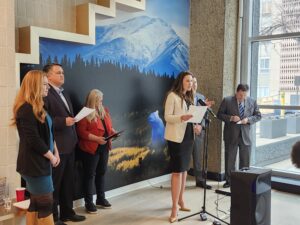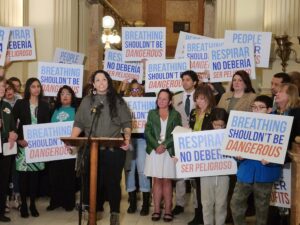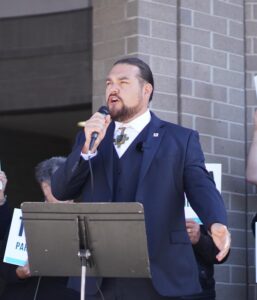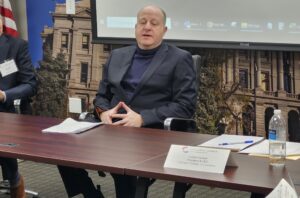Oil and gas companies, environmental groups and Gov. Jared Polis announced an agreement Monday that will jettison the most industry-opposed portions of three air-quality bills in exchange for creation of a new fee on drilling to help fund transit projects.
Other parts of the three bills — Senate Bills 165 and 166 and House Bill 1330, all products of the Legislative Interim Committee on Ozone Air Quality — will remain as well, including some potential penalties on repeat offenders of air-quality rules. The deal also will nix HB 1367, a lower-visibility bill that sought to remove a tax exemption from stripper wells, which Western Slope industry leaders warned could sap a valuable revenue source in their area.
The tendrils of the agreement stretch beyond this legislative session, first by getting both environmental groups and oil-and-gas-industry leaders to stop their efforts to put onto the November ballot opposing questions that would boost or rollback energy regulations. And, maybe just as importantly, the deal bars new legislation or ballot issues regarding the production or pre-production of oil and gas through 2026 — a provision that will be enforced, if necessary, by the veto pen of the Democratic governor.
“Stability for a vital industry”
Late Monday afternoon, industry, environmental and legislative leaders all celebrated the deal, calling it one that came about through extended conversation that picked up after legislative Democrats introduced the far-reaching air-quality bills in mid-February. Polis said it allows the state both to improve its air quality and to ensure the existence of the oil and gas industry isn’t threatened, and industry leaders said it will give them much-needed regulatory reliability after a half-decade of constantly moving goalposts.

Kait Schwartz, director of American Petroleum Institute Colorado, speaks about a slate of new environmental bills at a news conference in February.
“We have said for years that providing regulatory and legislative certainty for business owners and operators across the state and ensuring stability for a vital industry is of utmost importance. We are pleased to see that the governor agrees,” said Kait Schwartz, director for American Petroleum Institute Colorado. “The regulatory landscape for our industry has been completely overhauled during the last five years and it is crucial that those regulations, some of which have only just recently been implemented, be given the chance to work.”
The three bills at the heart of the agreement have created some of the sharpest divides in recent legislative memory, with supporters saying they were overdue steps to cleanup corporate pollution and opponents calling them existential threats to a $48 billion industry. A fourth bill, which died last month in its first committee, added to the tension by proposing to ban permitting for new oil-and-gas wells beginning in 2030.
SB 165 sought to pause pre-production activities like fracking between June and August, launch rulemaking to limit indirect-source emissions and begin state efforts to limit vehicle miles traveled. SB 166 would have created a new “repeat-offender” status for companies that violated air-quality regulations five times in three years and imposed heavy minimum fines on them. HB 1330 proposed increasing modeling requirements for air-quality permit applicants and requiring applicants for new or modified permits in disproportionately impacted communities to prove they would not add any new emissions.
End to most parts of air-quality efforts
Under the deal announced Monday, the three bills and HB 1367 will be killed, and all those proposed requirements will go away. What remains from the trio of proposals will be several important provisions that will clean up the low-income, high-pollution communities that environmental-justice activists have sought to help, said Ean Thomas Tafoya, Colorado state director for GreenLatinos.

Commerce City Councilwoman Renée Chacon speaks at a February news conference to unveil a new slate of environmental bills.
One bill expected to be introduced on Tuesday will seek to codify Polis’ 2023 executive order for drillers to reduce nitrous oxide emissions, fund community liaisons for members of DICs to have a voice in rulemakings and plug orphaned and marginal wells in those DICs. It also will require drillers to use best available technology along the Northern Front Range, increase maximum penalties for air-quality violations from $500 to $1,000 per day and allow regulators to mandate repeat violators fix high-emitting equipment through orders rather than just through legal settlements, Tafoya explained.
Another bill will create a new fee — expected to generate about $138 million annually — on producers based on the amount of oil and gas extracted from the ground, putting 80% of revenues to rail and transit projects and the other 20% to protection of critical habitat. Environmental groups have said moving people from vehicles to transit will cut emissions greatly, particularly in the U.S. Environmental Protection Agency’s ozone nonattainment area, while Polis has pushed to build rail along the Front Range and into the mountains.
While the regulations in the agreement are less extensive than those in the three soon-to-die bills, Polis administration officials had expressed serious misgivings about those proposals and insinuated they would be vetoed were they to reach his desk. Colorado Department of Public Health and Environment leaders said they would interfere with the effective emissions-reductions work they already are doing and argued in some cases that they would need hundreds of employees and four times the budget allocated in the bills.
Environmentalists laud air-quality deal
Tafoya, who worked as one of the primary negotiators to the deal, said in an interview Monday that the agreement takes several positive actions that communities like Commerce City or Globeville need to reduce pollution. It will help to cut the number of gas-powered vehicles on the roadways, offer new protections for those areas and create more public documentation of violations and air-quality measurements.

Ean Thomas Taffy, Colorado state director for GreenLatinos
“This agreement is something that many parties came together for,” he said, pointing to Polis’ citation of groups like Earthjustice, Conservation Colorado and the Southwest Energy Efficiency Project, as well as industry leaders Occidental, Civitas and Chevron. “We are supportive of this package. I think it does a lot for our disproportionately impacted communities who are suffering under air pollution.”
The deal also ends the threat of dueling measures on the November ballot that could have cost tens of millions of dollars in campaign resources, as both sides have agreed to stop any efforts from moving their questions forward.
What the ballot measures would have done
Environmental groups had submitted questions that would have created strict liability for oil-and-gas companies in the cases of harmful events, would have allowed citizen lawsuits against such firms and would have created a new right to a healthy environment. Oil-and-gas industry leaders, meanwhile, had put forward initiatives to require greater economic impact statements on environmental measures and to bar the state or local governments from limiting residents’ ability to use any fuel of their choice to heat their homes.
Colorado Oil & Gas Association President/CEO Dan Haley noted that with dozens of rules and laws still being implemented, the agreement will allow new regulations to take effect and prove their efficacy before any new ones are added.
Sen. Faith Winter, a Broomfield Democrat and sponsor of two of the four voided bills, called the agreement a “great first step” that will help to reduce dangerously high ozone levels and improve public health.
“The Colorado way”

Gov. Jared Polis speak to a Colorado Chamber of Commerce board meeting in February.
Polis said in a statement that the agreement takes more steps to improve air quality and transition to lower-emission transportation systems while removing the volatility that “divisive legislation” and lawmaking by election battles would have produced.
“Reaching a consensus with this diverse group of stakeholders, who rarely agree on anything, is a strong step for Colorado and our future,” Polis said in a statement. “The unintended consequences and unpredictability of proposed ballot measures would take Colorado in the wrong direction, and I am thrilled that we are following the Colorado way.”
While the agreement removes three of the most business-opposed bills from the legislative agenda with less than two weeks to go before the May 8 adjournment of the 2024 session, there is still one more air-quality proposal that major employers want to kill.
House Bill 1339, which cleared its first committee on April 18, would roll back concessions that manufacturers and energy firms received during two key rulemakings on limiting emissions last year. It is parked right now in the House Appropriations Committee and hasn’t received a date yet for its next hearing.
